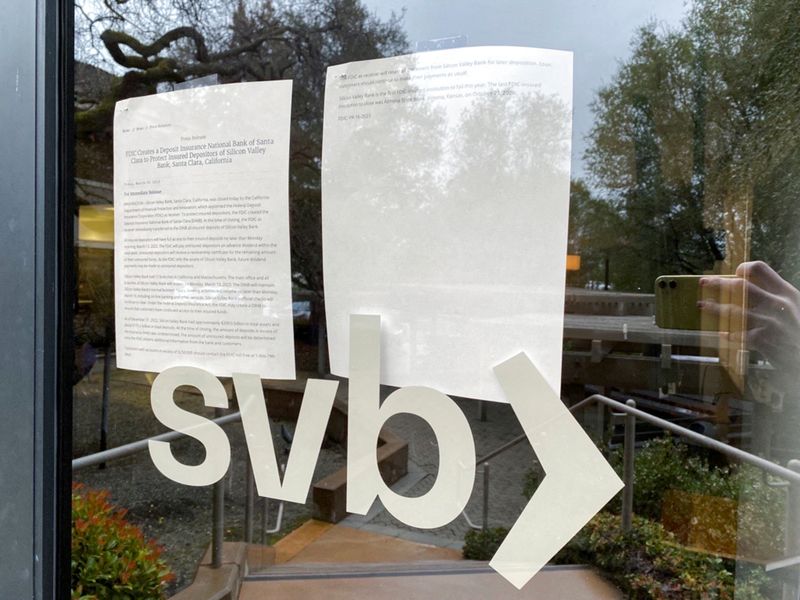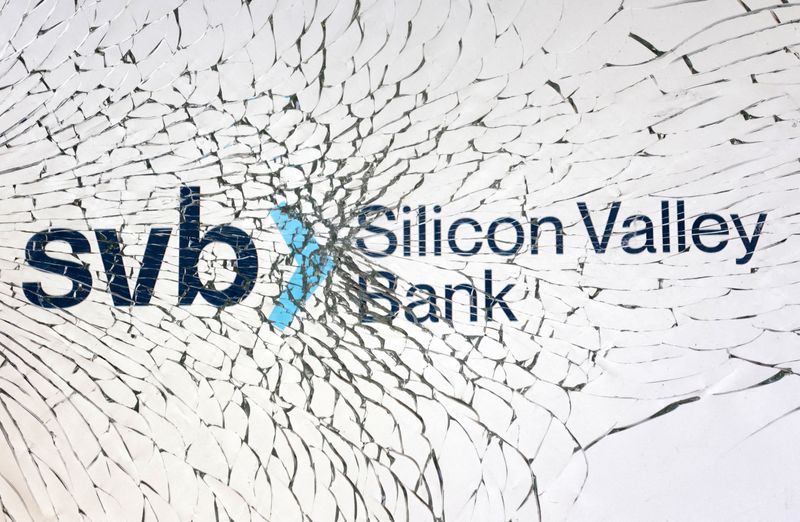By David French, Echo Wang and Alun John
(Reuters) - Startup-focused lender SVB Financial Group became the largest bank to fail since the 2008 financial crisis on Friday, in a sudden collapse that roiled global markets, left billions of dollars belonging to companies and investors stranded.
California banking regulators closed the bank, which did business as Silicon Valley Bank, on Friday and appointed the Federal Deposit Insurance Corporation (FDIC) as receiver for later disposition of its assets.
Based in Santa Clara, the lender was ranked as the 16th biggest in the U.S. at the end of last year, with about $209 billion in assets. Specifics of the tech-focused bank's abrupt collapse were a jumble, but the Fed's aggressive interest rate hikes in the last year, which had crimped financial conditions in the start-up space in which it was a notable player, seemed front and center.
As it tried to raise capital to offset fleeing deposits, the bank lost $1.8 billion on Treasury bonds whose values were torpedoed by the Fed rate hikes.
Silicon Valley Bank's failure is the largest since Washington Mutual went bust in 2008, a hallmark event that triggered a financial crisis that hobbled the economy for years. The 2008 crash prompted tougher rules in the United States and beyond.
Since then, regulators have imposed more stringent capital requirements for U.S. banks aimed at ensuring individual bank collapses won't harm the wider financial system and economy.
The main office and all branches of Silicon Valley Bank will reopen on March 13 and all insured depositors will have full access to their insured deposits no later than Monday morning, the FDIC said.
But 89% of the bank's $175 billion in deposits were uninsured as the end of 2022, according to the FDIC, and their fate remains to be determined.
The FDIC is racing to find another bank over the weekend that is willing to merge with Silicon Valley Bank, according to people familiar with the matter who requested anonymity because the details are confidential. While the FDIC hopes to put together such a merger by Monday to safeguard unsecured deposits, no deal is certain, the sources added.
An FDIC spokesperson did not immediately respond to a request for comment.
BUYERS SOUGHT
Separately, SVB Financial, the parent company of Silicon Valley Bank, is working with investment bank Centerview Partners and law firm Sullivan & Cromwell to find buyers for its other assets, which include investment bank SVB Securities, wealth manager Boston Private and equity research firm MoffettNathanson, the sources said. These assets could attract competitors and private equity firms, the sources added.
It's unclear if any buyer will step up to buy these assets without SVB Financial having filed for bankruptcy first. Credit ratings agency S&P Global (NYSE:SPGI) Ratings said on Friday it expected SVB Financial to enter bankruptcy because of its liabilities.
SVB did not respond to calls for comment.
Companies such as video game maker Roblox Corp and streaming device maker Roku (NASDAQ:ROKU) Inc said they had hundreds of millions of dollars in deposits at the bank. Roku said its deposits with SVB were largely uninsured, sending its shares down 10% in extended trading.
Technology workers whose paychecks relied on the bank were also worried about getting their wages on Friday. An SVB branch in San Francisco showed a note taped to the door telling clients to call a toll-free telephone number.
SVB Financial CEO Greg Becker sent a video message to employees on Friday acknowledging the "incredibly difficult" 48 hours leading up to the collapse of the bank.
The problems at SVB underscore how a campaign by the U.S. Federal Reserve and other central banks to fight inflation by ending the era of cheap money is exposing vulnerabilities in the market. The worries walloped the banking sector.
U.S. banks have lost over $100 billion in stock market value over the past two days, with European banks losing around another $50 billion in value, according to a Reuters calculation.
U.S. lenders First Republic Bank (NYSE:FRC) and Western Alliance (NYSE:WAL) said on Friday their liquidity and deposits remained strong, aiming to calm investors as their shares fell. Others such as Germany's Commerzbank (ETR:CBKG) issued unusual statements to reassure investors.
MORE PAIN
Some analysts forecast more pain for the sector as the episode spread concern about hidden risks in the banking sector and its vulnerability to the rising cost of money.
"There could be a bloodbath next week as...short sellers are out there and they are going to attack every single bank, especially the smaller ones," said Christopher Whalen, chairman of Whalen Global Advisors.
U.S. Treasury Secretary Janet Yellen met banking regulators on Friday and expressed "full confidence" in their abilities to respond to the situation, Treasury said.
The White House said on Friday it had faith and confidence in U.S. financial regulators, when asked about the failure of SVB.
The genesis of SVB's collapse lies in a rising interest rate environment. As higher interest rates caused the market for initial public offerings to shut down for many startups and made private fundraising more costly, some SVB clients started pulling money out.
To fund the redemptions, SVB sold a $21 billion bond portfolio consisting mostly of U.S. Treasuries on Wednesday, and said it would sell $2.25 billion in common equity and preferred convertible stock to fill its funding hole.

By Friday, the collapsing stock price had made its capital raise untenable and sources said the bank tried to look at other options, including a sale, until regulators stepped in and shut the bank down.
The last FDIC-insured institution to close was Almena State Bank in Kansas, on Oct. 23, 2020.
(Writing By John O'Donnell, Noor Zainab Hussain, Paritosh Bansal; Additional reporting by Niket Nishant, Emma-Victoria Farr, Nathan Frandino, Anna Tong, Krystal Hu, Greg Bensinger, Pete Schroeder, Greg Roumeliotis, Jo Mason, Marc Jones, Iain Withers, Elizabeth Howcroft, Noel Randewich, Yoruk Bahceli, Lananh Nguyen, Eva Matthews and Nupur Anand; Writing by Nick Zieminski; Editing by Toby Chopra, Anna Driver, William Mallard and Raju Gopalakrishnan)
